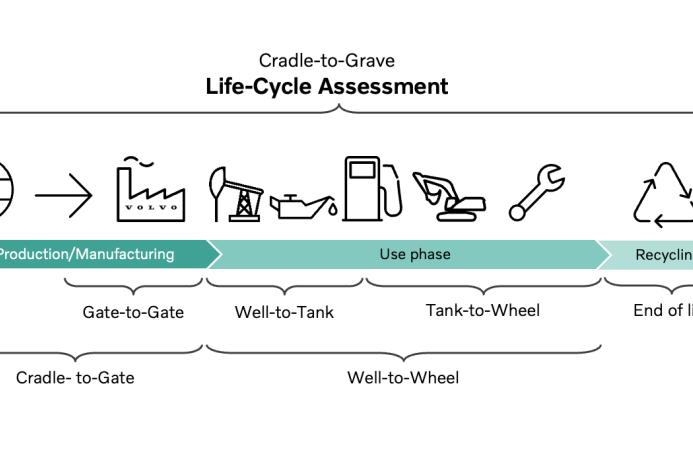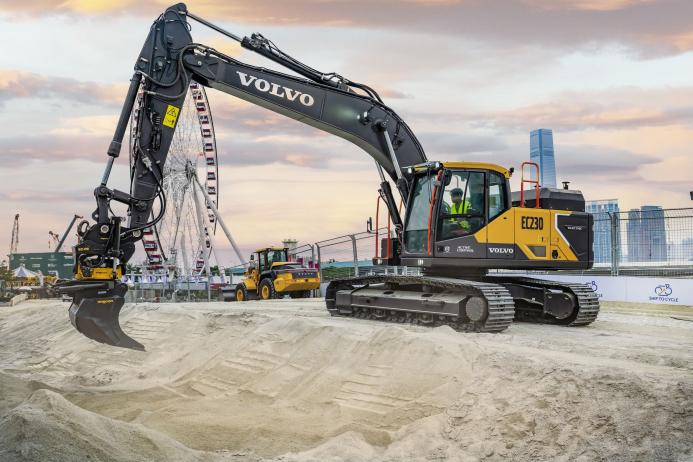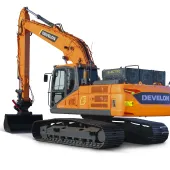Volvo CE reveal industry’s most extensive PCF reports
Construction equipment manufacturer discloses extensive catalogue of Product Carbon Footprint reports
VOLVO CE are leading sustainable change by disclosing the industry’s most extensive catalogue of Product Carbon Footprint (PCF) reports – making it easy for customers to take active steps to reduce their environmental impact. The reports confirm that electric machines are a more sustainable choice compared with conventional diesel machines, when looking at greenhouse gas emissions over their entire life cycle.
Determined to be at the forefront of the industry decarbonization transformation, Volvo CE are publishing their PCF reports providing vital data for customers to understand their complete emissions and take action to reduce their own carbon footprint. Volvo CE are also sharing their PCF methodology on the company website, showing how data can be used to drive change. By doing this, Volvo CE are delivering a real and proven framework in which to move collectively towards global and national climate goals.
The detailed methodology, developed in house by Volvo CE experts, works by analysing the carbon footprint of every aspect of a product’s life – incorporating both traditional and electric machines across the company’s far-ranging portfolio. It covers all steps from the extraction of raw materials, component manufacturing and machine assembly, through to recycling and end of life. The principles of the methodology are based on two global standards: the global ISO standard for Life Cycle Assessment and the Green-house Gas Protocol.
The numbers are translated into a report for each product, providing a simple baseline from which to then take action to decarbonize. This is essential information for customers to make choices on which equipment to use in their projects, as well as for Volvo CE who have the ambition to reach net-zero greenhouse gas emissions in their entire value chain by 2040. To achieve such results, long-term, stepwise, year-to-year actions are required by all stakeholders in the value chain. This is a tool to both measure progress and make decisions that drive actions in the right direction.

Rickard Alm, head of the Life Cycle Assessment (LCA) programme at Volvo CE, said: ‘Customers are now rightly looking with absolute scrutiny at carbon performance – on a par with other considerations like cost and quality. With our Product Carbon Footprint reports, we are making it easier to have quick access to the information needed and enabling them to act on their decarbonization ambitions.
‘We are proud to be at the forefront with the most extensive PCF analysis available today in the construction industry to ensure the right choices are made now to deliver on our sustainable transformation.’
The work of the Volvo CE LCA programme is constantly evolving. For the PCF analysis, this means the number of product reports is continuously expanding, prioritized mainly based on sales volume. Today, customers can visit the Volvo CE website and download PCF reports on conventional articulated haulers, wheel loaders, and excavators, as well as selected electric offerings, such as the ECR25 Electric and EC230 Electric excavators.

‘Depending on the energy mix used to charge the batteries, the emissions from the use phase of an electric machine are reduced by up to 95%,’ said Mr Alm. ‘While battery manufacturing results in a higher carbon footprint for electric machines during the production phase, when compared with diesel, overall carbon emissions for an electric machine are still reduced 80–90% over the entire life cycle.’
The LCA programme forms part of a wider sustainability approach by Volvo CE that also includes implementing low-carbon materials and moving to more fossil fuel-free alternative drivelines, such as those provided by their commercial line-up of electric machines and charging solutions.
Volvo CE say the methodology used to produce these reports can be brand-agnostic and is open for any other OEM to explore and implement. As new legislations come into effect, the calculations used within the methodology will continue to be reviewed to ensure accuracy.










